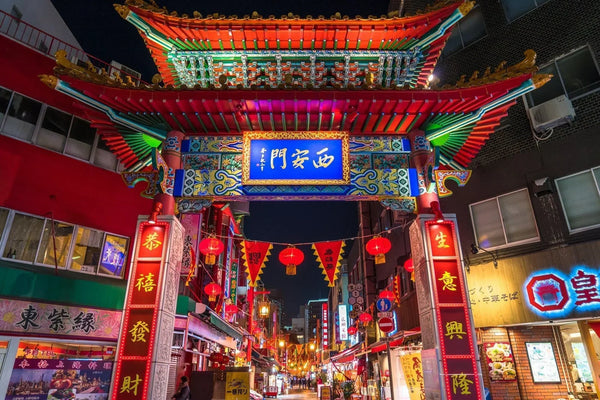
Jump to:
Chinatowns are vibrant cultural and culinary hubs in cities around the world, and Japan is no exception. Chinatown Japan offers fascinating districts where Chinese traditions meet Japanese charm, creating a unique atmosphere full of history, architecture, and, of course, incredible fusion of Japanese-Chinese food.
Whether you’re planning a foodie adventure or exploring Japan’s rich cultural tapestry, this guide will introduce you to the most famous Japan Chinatowns, including hidden gems and must-try dishes.
From the bustling streets of Yokohama Chinatown to the convenient and lively Osaka-accessible Kobe Chinatown and the historic Nagasaki Chinatown, each neighborhood tells its own story and promises unforgettable experiences.
Main Chinatowns in Japan
Japan has three main Chinatowns. These are located in the convenient proximity of major tourist destinations: Yokohama (near Tokyo); Kobe (near Osaka & Kyoto); and Nagasaki on the island of Kyushu.
1. Yokohama Chinatown (Yokohama Chukagai)

The largest Chinatown in Japan, Yokohama Chinatown, is a delightful detour just south of Tokyo. Easily accessible by train from major Tokyo stations like Shibuya and Shinjuku, Yokohama is an ideal day trip or evening adventure.
Near Chinatown are other Yokohama sights such as Yamashita Park, Minato Mirai 21, Sankeien Gardens and the Cup Noodles Museum.
2. Kobe, Near Osaka, Chinatown (Nankinmachi)
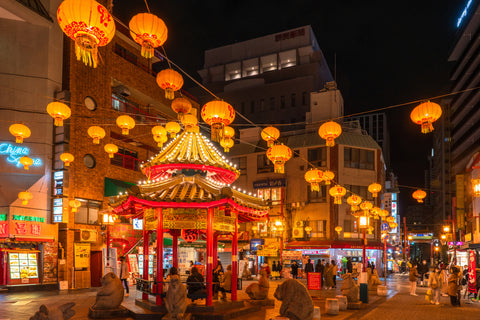
Located in the beautiful port city of Kobe, this Osaka-accessible area offers a charming atmosphere in a fairly compact setting. You can reach Kobe and Nankinmachi by train from Osaka or even Kyoto, making it a great stop on a Kansai region itinerary.
You can also visit other popular Kobe stops such as Motomachi, the Old Foreign Settlement, Meriken Park, and other nearby areas.
3. Nagasaki Chinatown (Shinchi Chinatown)
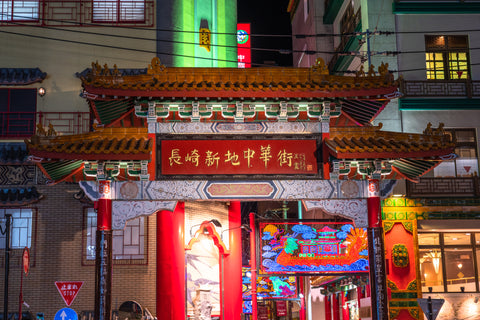
This historic Japan Chinatown boasts a long and fascinating past. A vibrant port city on the island of Kyushu, Nagasaki can be reached by train from Fukuoka, or by domestic flight from Tokyo, Osaka, and elsewhere. It was the port’s history of trade that helped Nagasaki Chinatown start and flourish.
History Of Japan's Chinatowns
The history of Chinatowns in Japan is deeply intertwined with the country's opening to foreign trade in the mid-19th century.
After centuries of relative isolation, ports like Yokohama, Kobe and Nagasaki finally began welcoming international traders. Chinese merchants were among the first to arrive; they settled near the ports, forming the foundation of what would become Japan's Chinatowns.
While the Chinese population in Japan is somewhat smaller compared to those in the US, Canada, UK or Australia (around 0.7% of Japan’s total population is ethnic Chinese), Chinatowns have thrived as cultural hubs.
The Chinatowns of Kobe, Yokohama and Nagasaki offer a fascinating glimpse into the blending of Chinese and Japanese traditions, from architecture and cuisine to festivals and customs.
Why Visit A Chinatown In Japan?
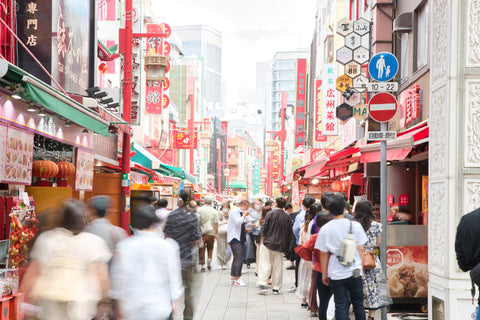
If you're a foodie, visiting a Chinatown in Japan is a must! These districts are a haven for delicious Chinese cuisine, often with unique Japanese twists.
Beyond the food, Japan Chinatowns offer a lively atmosphere, with colorful shops selling everything from traditional Chinese goods to quirky souvenirs.
Exploring a Chinatown is also a great way to immerse yourself in a unique slice of Japanese history and culture (one that many visitors or Japan aficionados often overlook).
What to Eat in Japan Chinatown
Japan's Chinatowns are a feast for the senses, offering a variety of exciting things to see, do and of course, taste! Ramen and gyoza are longtime favorites, of course, but don’t sleep on nikuman or chanpon, either!
Here's a look at the experiences awaiting you.
Pork Buns or Nikuman

Yokohama Chinatown is a paradise for foodies, with over 200 restaurants to choose from (including favorites from the Hunan, Sichuan, Guangdong (Cantonese) regions and more.
Be sure to try the signature dish of Yokohama Iekei Ramen. For a casual treat, grab some juicy pork buns (nikuman) from a street vendor.
Rice Dumplings
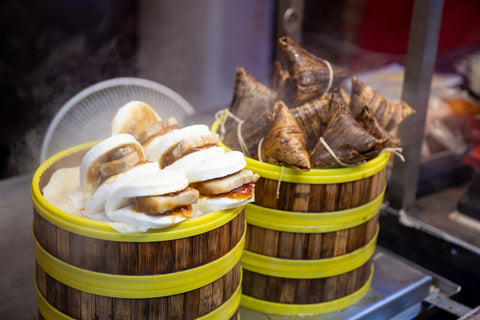
Kobe, a city famous for its beef, offers plenty of tasty and affordable Chinese cuisine in its Nankinmachi Chinatown neighborhood. Nikuman are very popular with locals and visitors alike here. You’ll find sidewalk stands hawking everything from rice dumplings, savory buns and fried everything on a stick, to sweets, juices and much more.
Nagasaki Champon
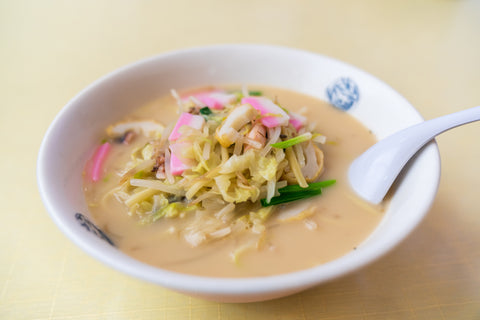
Famed for its Nagasaki Champon and Sara Udon dishes, Nagasaki puts a unique spin on familiar classics. Champon is a hearty noodle soup with seafood and vegetables, while Sara Udon features crispy noodles in a flavorful sauce. Be sure to seek these Chinatown specialties during your visit.
Restaurant Recommendations For Your Japan Chinatown Visit

While the culinary scene in Japan is constantly evolving, many tried and true offerings in the Chinatowns of Kobe, Nagasaki and Yokohama are well worth a visit.
The fare runs the full range, from street eats to multi course banquets. It all really depends on your budget and itinerary, of course, as well as your taste buds!
Yokohama Chinatown Eats
A visit to Yokohama Chinatown wouldn’t be complete without a taste of its signature dish: Yokohama Iekei Ramen. The best options include:
- Honmarutei
- Menkoitei
- Yoshu Menbo
- Yoshushonin
For a taste of Cantonese classics, head to Manchinro restaurant, known for its lavish interior and delicious Peking Duck.
To sample xiao long bao (or “shoronpo”) Shanghai-style soup dumplings bursting with flavor, try Tohoku Jinka.
As with any other foodie destination, you can’t go wrong if you “follow your nose” – or follow the queues, when you see folks lined up for good eats.
Noshing in Nankinmachi: What to Eat in Kobe Chinatown
Kobe’s Chinatown has some local and visitor favorites that are not to be missed.
This includes both Chinese classics, Japanese twists on Chinese food… and even the famed Japanese delicacy of Kobe beef.
- Yunyun is a popular spot, with Japanese style (take-away) dim sum and Chinese comfort food; you’ll know it when you see the line (fast moving and well worth it)
- Popular Chinese sit-down restaurants here include Daidoko, Sho-En and Gun’Ai
- Nikuman or butaman (pork buns) from Roushouki (pro tip, if the line here is too long, walk a few steps cross the plaza and look for the sign that says “曹家包子館” (with a pig statue outside), and you’ll get the same buns with a much shorter line… nearby Ikkanrou also has great steamed buns
- Bakery Riki around the corner from Chinatown always has a line, too – but well worth it for (nothing Chinese but) tasty French pastry
- Kobe Korokke is well known for its Japanese style croquettes, a good snack for your upcoming shinkansen ride or to take back to your hotel
While you’ll see standing bars offering Kobe beef slices, sushi or steaks in this area, there are better places in Kobe to savor its eponymous beef (such as Mouriya, Misono and Iwasaki).
Nagasaki Chinatown’s Culinary Array
If you’re enjoying Hakata ramen in Fukuoka, why not extend the Chinese theme and enjoy lunch or dinner in Chinatown as part of your visit to historic, picturesque Nagasaki?
- Shikairou is a must-visit for its fantastic Champon and mouth-watering Sara Udon dishes.
- Mirakuen is a great choice for Nagasaki Champon, too.
- Toh-En serves up a delicious, piquant mabo tofu.
- For a delicious and casual bite, try the street vendors offering nikuman in various flavors.
Chinese food in Nagasaki, be it “authentic” fare or dishes with a Japanese twist such as Chanpon, will be a great memory of your Japan/Kyushu trip, and serve to impress your friends and followers on the ‘Gram!
Is It Worth Visiting a Chinatown If You Come To Japan?

If you're passionate about food, curious about cultural crossroads or simply love exploring vibrant neighborhoods, then a visit to one of Japan's Chinatowns is definitely worth adding to your itinerary.
These lively districts offer a unique blend of Chinese and Japanese flavors, a glimpse into a fascinating history and a chance to experience a different side of Japan.
Whether you choose the bustling streets of Yokohama Chinatown, the compact and convenient Chinatown scene that is Kobe's Nankinmachi or the historic charm of Nagasaki's Shinchi Chinatown, you're sure to create unforgettable memories and maybe even discover a new favorite dish!
Have you experienced a Chinatown in Japan? Tell us about it in the comments below!


0 comments